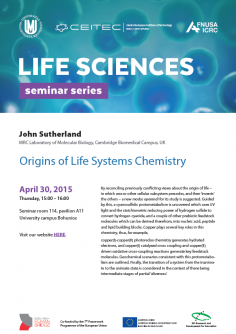Abstract:
By reconciling previously conicting views about the origin of life – in which one or other cellular subsystem precedes, and then ‘invents’ the others – a new modus operandi for its study is suggested. Guided by this, a cyanosuldic protometabolism is uncovered which uses UV light and the stoichiometric reducing power of hydrogen sulde to convert hydrogen cyanide, and a couple of other prebiotic feedstock molecules which can be derived therefrom, into nucleic acid, peptide and lipid building blocks. Copper plays several key roles in this chemistry, thus, for example, copper(I)-copper(II) photoredox chemistry generates hydrated electrons, and copper(I) catalysed cross coupling and copper(II) driven oxidative cross-coupling reactions generate key feedstock molecules. Geochemical scenarios consistent with this protometabolism are outlined. Finally, the transition of a system from the inanimate to the animate state is considered in the context of there being intermediate stages of partial ‘aliveness’.








